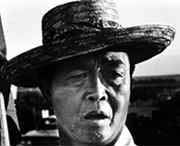
Home > Exhibits > Introduction

The United Farm Workers Union
The UFW began when Cesar Chavez founded the National Farm Workers Association (NFWA) in 1962. Within three years, Chavez recruited over 1,200 members. In 1965, the small AFL-CIO farm labor union, the Agricultural Workers Organizing Committee (AWOC), whose members were predominately Filipino, left the fields and called a strike in Delano, California in September. They struck for a fifteen cents an hour increase in their hourly wage. The Great Delano Grape Strike had begun. Chavez and the NFWA joined forces with AWOC, and together, they had over 2,000 striking members.

Organizer and UFW Vice President Dolore Huerta organizing grape pickers in the field, 1960s

Pete Velasco, an important strike leader in 1965 and a lifelong UFW officer, 1969. Courtesy of El Malcriado
The grape growers refused to bargain with the strikers. Many of them supported brutality against the striking workers, often with the aid of local law enforcement. Pickets were harassed, shot at and beaten.
In 1972, UFWOC was renamed the United Farm Workers of America with Cesar Chavez as president. Following the success of the Great Grape Boycott, Chavez and the UFW campaigned against the use of pesticides, child labor, substandard housing, and one of the most hated foes of all, the back-breaking short-handled hoe. They fought against "sweetheart" contracts between the International Brotherhood of Teamsters and growers who feared the rising power of the UFW. Chavez also went on three lengthy fasts to personally and publicly sacrifice for non-violence and social justice for farm workers.
The UFW continued to grow and gained bargaining agreements with many major growers. Today, Arturo Rodriguez and the UFW continue the battle for social and economic justice for farm workers.
Bumpersticker from 1970s
United Farm Workers Organizing Committee
A program cover for a production by El Teatro Campesino, 1971


